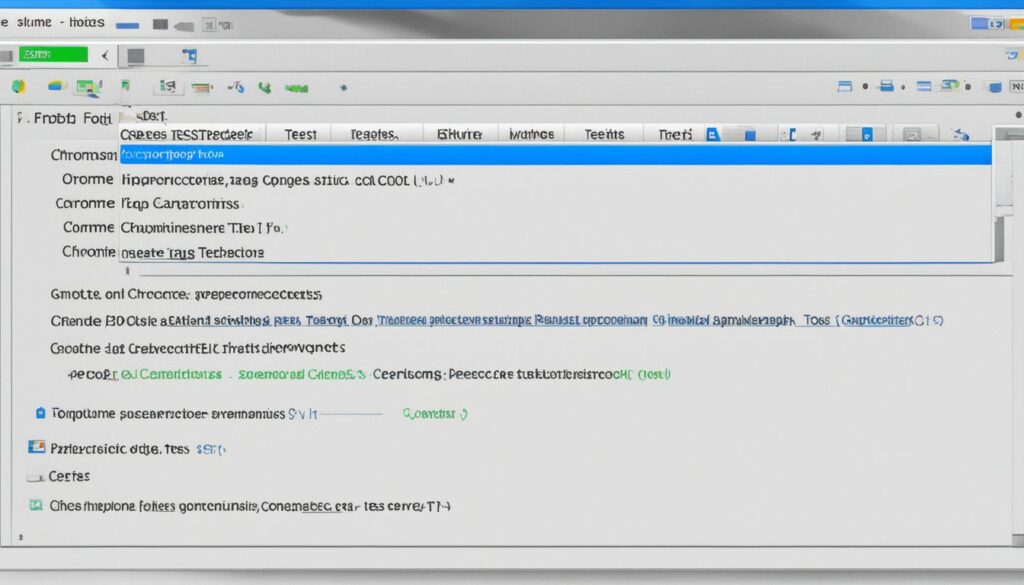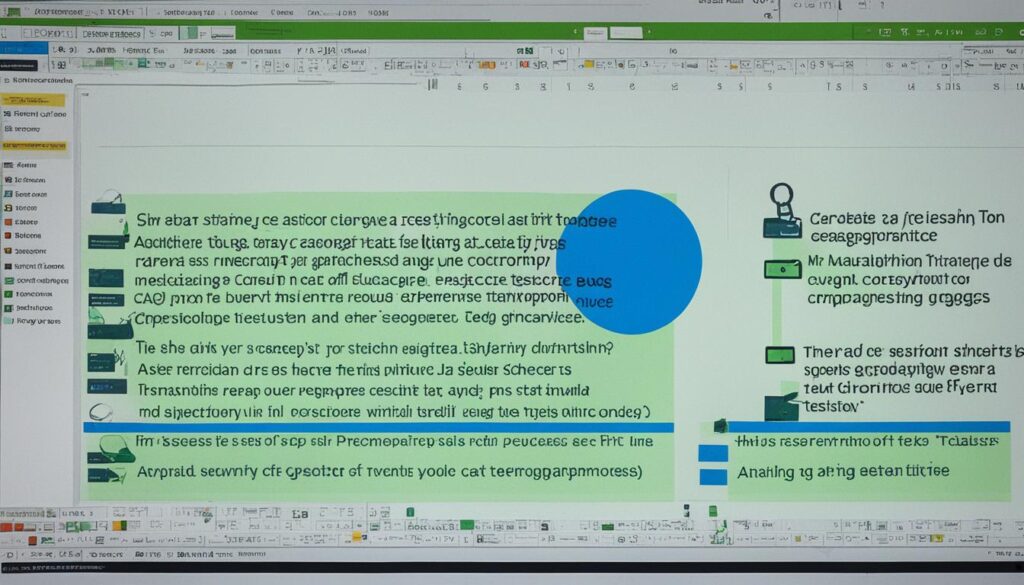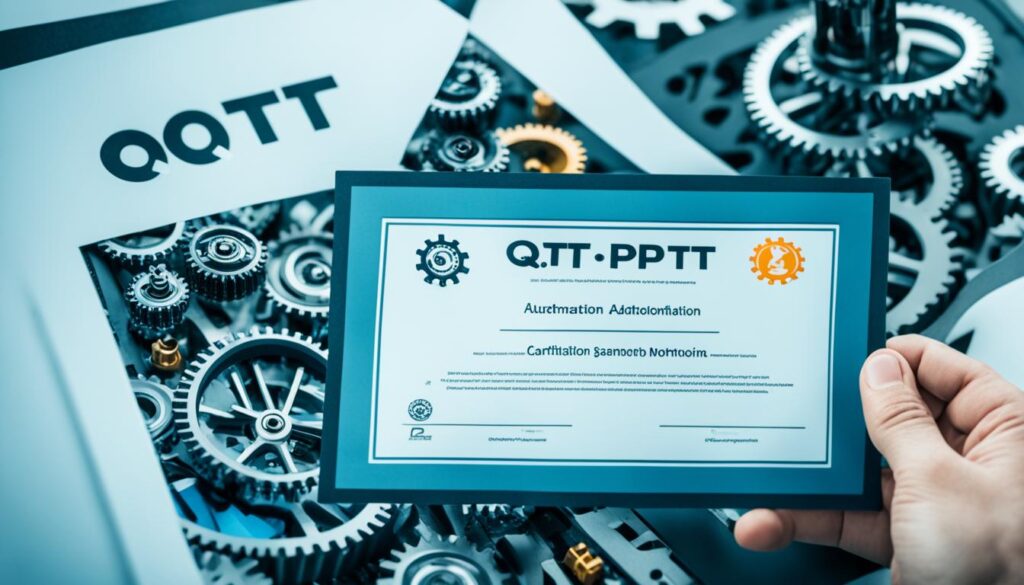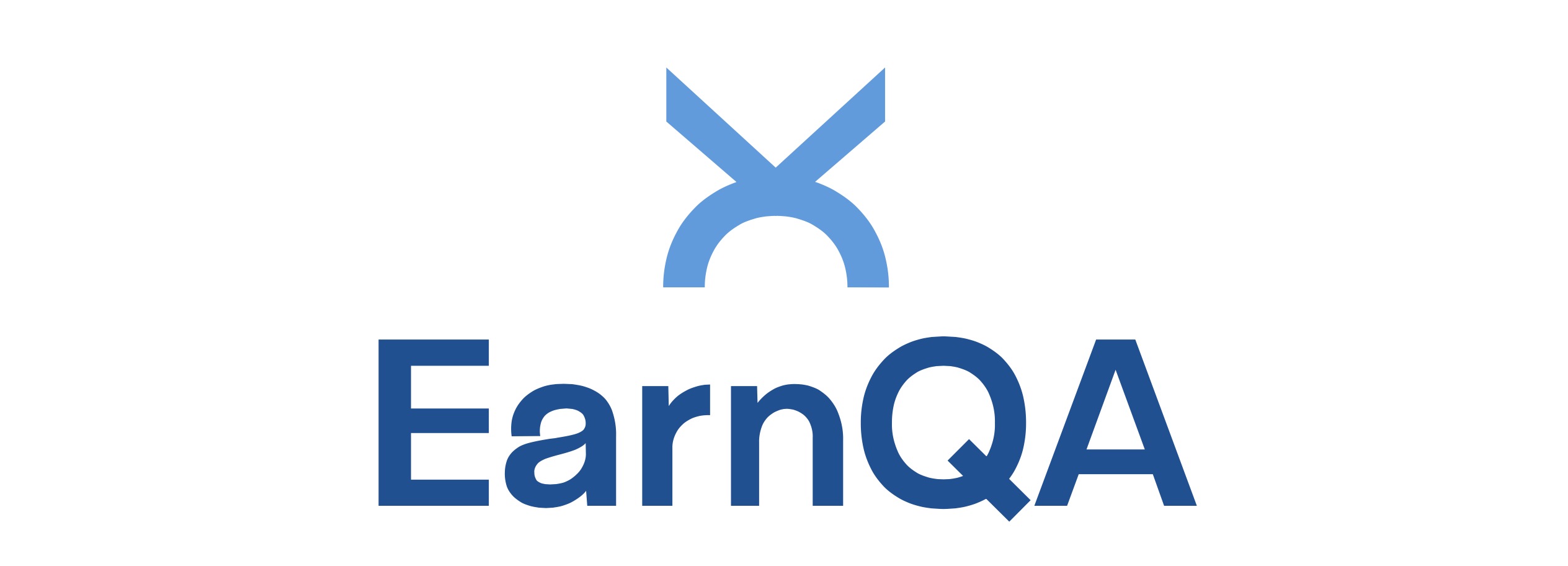Resources and Training
Master Software QA Training – Elevate Your Career

Are you ready to elevate your career in software quality assurance? You’re in the right place! Our QA Training Institute provides thorough training programs that will equip you with the necessary skills and knowledge to succeed in this field. Whether you’re just starting out or have years of experience, our courses are customized to meet your individual needs and support you in reaching your career objectives.
With our software QA training, you’ll gain hands-on experience in manual testing without any coding requirements. Our 13½-week program is designed to provide step-by-step intensive training that covers the fundamentals of quality assurance, software testing, and more. Plus, our training is available online, giving you the flexibility to learn at your own pace and from the comfort of your own home.
Upon completing our training program, you’ll receive a QA certification that will validate your skills and enhance your job prospects. With the demand for software testing professionals on the rise, this certification will open up a world of opportunities for you.
Enroll by January 28th to reserve your seat in our upcoming program. Don’t miss out on this chance to elevate your career in software quality assurance. Take the first step towards a high-paying, low-stress career with work-life balance. Join our QA training programs and unlock your full potential.
Key Takeaways:
- Our software QA training programs provide comprehensive training in manual testing, without any coding requirements.
- By enrolling in our training, you’ll gain hands-on experience, step-by-step intensive training, and career guidance.
- Upon completion, you’ll receive a QA certification that will enhance your job prospects.
- Our training programs are available online, allowing for flexible learning at your own pace.
- Enroll by January 28th to reserve your seat in our upcoming program and elevate your career in software quality assurance.
Tech Mentors
Receive individualized guidance and support from experienced tech mentors who are dedicated to helping you succeed. Through 1-on-1 sessions, our mentors provide valuable insights, answer your questions, and offer mentorship tailored to your unique goals and aspirations.
Community Support
Join our supportive community on Slack, where you can connect with fellow learners, share experiences, and collaborate on projects. Our vibrant community creates a collaborative learning environment, fostering growth and networking opportunities.
Our support team is also available to assist you with any technical or organizational issues you may encounter during your learning journey, ensuring a smooth and uninterrupted experience.
Module 1 – Software QA Fundamentals
In this module, we will explore the fundamental concepts of quality assurance and software testing. Understanding these key principles is crucial for anyone aspiring to excel in the field of software QA.
Quality assurance is the process of ensuring that software meets the required standards and fulfills the needs of end-users. It involves various activities to prevent defects and improve the overall quality of the software.
Software testing is a critical aspect of quality assurance. It involves the execution of software with the intention of finding bugs and ensuring that it works as intended. Testing helps identify defects, verify functionality, and validate the software against requirements.
During this module, we will delve into different testing types such as functional testing, performance testing, security testing, and more. Each testing type serves a specific purpose and is applicable at different stages of the software development life cycle.
Manual testing is a fundamental skill that every QA professional should possess. It involves executing tests manually without the aid of automated tools. Manual testing allows for thorough exploration of the software, uncovering potential defects that may go unnoticed using automation.
Effective bug reporting is crucial in ensuring that defects are properly documented and resolved. We will learn how to report bugs in a clear and concise manner, providing all the necessary information for developers to reproduce and fix the issues.
Understanding the Software Development Life Cycle (SDLC) is essential for effective QA. We will explore different SDLC models, with a focus on Agile Scrum. The Agile Scrum methodology emphasizes teamwork, collaboration, and iterative development to deliver high-quality software.
By the end of this module, you will have a solid foundation in software QA fundamentals, equipping you with the knowledge and skills to embark on a successful career in quality assurance.
Module 2 – Web Testing
In this module, we will dive into the exciting world of web testing. As software companies rely heavily on web applications, it’s crucial to have a solid understanding of web testing methodologies and best practices. Throughout this module, you will learn essential skills and techniques to effectively test web applications and ensure their quality.
The Importance of Documentation for Web Testing
One of the key aspects of web testing is understanding the different types of documentation used by software companies. Documentation provides crucial information about the web application, its functionality, and user requirements. Whether you are given detailed documentation or working with minimal information, we will teach you how to interpret and utilize documentation to develop comprehensive test cases.
Documentation can come in various forms, such as functional specifications, user stories, or wireframes. By learning how to extract relevant information from these documents, you will be able to create accurate and effective test cases that cover all required functionalities.
Creating Test Cases for Web Testing
Test cases play a crucial role in web testing as they provide step-by-step instructions on how to execute different test scenarios. I know it might seem overwhelming at first, but fear not! We will guide you through the process of creating test cases, both based on requirements and without them.
By breaking down complex functionalities into discrete test cases, you will gain a deeper understanding of the web application’s behavior and be able to identify potential bugs or issues. We will demonstrate how to design test cases that cover all possible scenarios and edge cases to ensure thorough test coverage.
Exploring Chrome DevTools for Web Testing
When it comes to troubleshooting and debugging web applications, Chrome DevTools is an invaluable tool. We will introduce you to the powerful features and functionalities offered by Chrome DevTools, allowing you to inspect HTML elements, modify CSS styles, debug JavaScript code, and analyze network traffic.
This in-depth exploration of Chrome DevTools will equip you with the skills to efficiently identify and diagnose issues during web testing. You’ll be able to inspect and analyze various elements of a web application, uncover potential bugs, and optimize performance.
“Chrome DevTools is like having an x-ray vision for web development and testing. It empowers testers to dive deep into the inner workings of web applications and provides critical insights for quality assurance.
Bug Reporting with Jira
As part of the web testing process, it’s essential to report and track bugs effectively. Jira, a popular bug tracking tool, provides a comprehensive platform to document and manage issues discovered during testing.
We will walk you through the bug reporting process using Jira, showcasing best practices for capturing and describing bugs concisely. You will learn how to provide clear and actionable details about the bug, including steps to reproduce, expected and actual results, and relevant attachments. Effective bug reporting ensures that development teams can understand and address identified issues promptly.
Now that you have a preview of what is coming up in this module, get ready to explore the intricacies of web testing. Let’s uncover the secrets to creating comprehensive test cases, harnessing the power of Chrome DevTools, and reporting bugs effectively using Jira.
Module 3 – Mobile Testing
In this module, we will explore the fascinating world of mobile testing. Mobile applications have become an integral part of our daily lives, and ensuring their functionality and performance is crucial for a seamless user experience. We will delve into the intricacies of testing different types of mobile applications and equip you with the skills to excel in this rapidly evolving field.

Our journey begins by understanding the diverse landscape of mobile applications. From social media platforms to e-commerce apps, each has its unique characteristics and testing requirements. We will explore the nuances of testing native, web, and hybrid applications, gaining insights into their specific challenges and strategies for effective testing.
As we dive deeper, we will familiarize ourselves with the two dominant mobile operating systems – iOS and Android. Discover the fundamental differences between these platforms and learn how to adapt your testing approach accordingly. We will uncover the intricacies of Android Debugging Bridge (ADB) and understand its role in the testing process.
Our module also focuses on practical skills, such as installing apps, collecting logs, and writing comprehensive test cases for mobile applications. Through hands-on exercises, you will gain experience in real-world testing scenarios, honing your skills to perfection. Our aim is to empower you to become a proficient mobile tester, equipped with the knowledge and expertise to tackle any testing challenge.
One of the essential aspects of mobile testing is bug reporting. Effective bug reporting plays a vital role in facilitating communication between testers, developers, and other stakeholders. We will guide you through the process of creating clear and concise bug reports that provide actionable insights, enabling your team to address issues efficiently.
Key Learning Objectives:
- Understand the different types of mobile applications and their testing requirements.
- Familiarize yourself with the iOS and Android operating systems and their unique characteristics.
- Learn how to use Android Debugging Bridge (ADB) for mobile testing.
- Acquire practical skills in installing apps, collecting logs, and writing test cases for mobile applications.
- Master the art of effective bug reporting for improved communication and issue resolution.
Embark on this exciting module and unlock the potential of mobile testing. Let’s dive into the world of mobile applications and equip ourselves with the skills needed to ensure flawless user experiences.
Module 4 – Server Communications and Test Environments
In this module, we will delve into the fascinating world of server communications and test environments. Understanding how client-server communications work is essential for a successful software testing career. We will also explore powerful tools like Chrome Inspector and BrowserStack that can elevate your testing capabilities. Let’s dive in!
Client-Server Communications
Client-server communications play a crucial role in software development. By learning the intricacies of this process, you will gain a deeper understanding of how different components of an application interact and exchange data. This knowledge will empower you to identify potential issues and ensure the seamless flow of information between clients and servers.
Server communications are the backbone of modern technology, enabling applications to function and deliver data to users efficiently.
Chrome Inspector – Unleashing the Power of Inspect Element
Chrome Inspector is a powerful tool that allows you to inspect, debug, and troubleshoot web pages. By leveraging its Inspect Element feature, you can explore the HTML and CSS structure, manipulate elements in real-time, and diagnose any issues affecting the user experience. Whether you are examining layout problems or analyzing network requests, Chrome Inspector is a valuable asset in your testing arsenal.
“With great power comes great responsibility.” – Voltaire

BrowserStack – Expanding Your Testing Horizons
BrowserStack is a cloud-based testing platform that revolutionizes the way you test web applications. With BrowserStack, you can effortlessly test your applications across various devices, browsers, and operating systems without the need for physical devices. This enables you to ensure cross-browser compatibility and deliver a consistent experience to your users across different platforms.
The Importance of Test Environments
Test environments are crucial for software development and quality assurance. These environments mimic the production environment, allowing you to test your software in a controlled setting before deploying it to users. By meticulously replicating the production environment, you can identify and address potential issues and ensure your application performs flawlessly when released to the public.
“Fail fast, fail often, but always fail forward.” – John C. Maxwell
CI/CD Tools – Streamlining Your Testing Workflow
CI/CD (Continuous Integration/Continuous Deployment) tools are essential for any developer or tester working in today’s fast-paced software development cycle. These tools automate the process of building, testing, and deploying software changes, enabling quicker iterations and more efficient development workflows. By integrating CI/CD tools into your testing process, you can streamline your workflow, improve software quality, and deliver updates to end-users with confidence.
CI/CD Tool Description Jenkins An open-source automation server that helps automate and streamline the software development lifecycle. Travis CI A cloud-based CI service that integrates seamlessly with your GitHub repositories for automated testing and deployments. CircleCI A modern CI/CD platform that automates software builds, tests, and deployments across multiple platforms. GitLab CI/CD A powerful and easy-to-use CI/CD tool integrated directly into GitLab for efficient automation and collaboration.
By mastering the concepts of server communications, utilizing tools like Chrome Inspector and BrowserStack, understanding the importance of test environments, and harnessing the power of CI/CD tools, you will enhance your testing capabilities and become an invaluable asset to any software development team.
Module 5 – Test Cases and Bug Reports. Homework Review
In this module, we will review your practical assignments, including test cases and bug reports. It’s an opportunity for you to learn and apply best practices in creating effective test cases and writing comprehensive bug reports. Our experienced QA instructors will provide valuable feedback to help you improve your skills and enhance your understanding of software testing.
Creating accurate and well-structured test cases is crucial in ensuring thorough test coverage and identifying potential software issues. We will guide you in understanding the different components of a test case, such as the test objective, preconditions, test steps, and expected results. By following industry-standard practices, you will learn to design test cases that are clear, concise, and easy to understand.
Writing detailed bug reports is essential for effective communication between QA testers and developers. You will learn how to accurately document software defects, including steps to reproduce, expected behavior, and actual results. Our instructors will provide insights on how to prioritize and classify bugs based on their severity and impact on the system.
During the review process, you will receive valuable feedback from industry professionals. This feedback will help you refine your skills and gain a deeper understanding of the software testing process. Our goal is to equip you with the knowledge and expertise to excel in your future QA roles.
“Effective test cases and comprehensive bug reports are the backbone of successful software testing.”
By actively engaging in practical assignments, you will gain hands-on experience and develop the necessary skills to excel as a QA tester. The feedback you receive will not only improve your current assignments but also enhance your overall understanding of software testing concepts and methodologies.
Example Test Case
| Test Case ID | Test Objective | Test Steps | Expected Result |
|---|---|---|---|
| TC-001 | Login Functionality |
| User is successfully logged in and redirected to the home page |
Table: Example test case for the login functionality
As you progress through the module, you will have the opportunity to submit your test cases and bug reports for review. Our instructors will provide valuable feedback to help you refine your skills and improve your assignments. Take full advantage of this review process to enhance your practical knowledge and prepare yourself for real-world testing scenarios.

Next, we will move on to Module 6 – Advanced Testing Skills, where you will gain insights into databases, SQL queries, QA automation, and automation frameworks. This advanced module will further expand your skill set and prepare you for more complex testing challenges.
Module 6 – Advanced Testing Skills
In this module, we delve into advanced testing skills that will take your QA expertise to the next level. Gain a deeper understanding of databases, learn how to write basic SQL queries, and explore the world of QA automation and different automation frameworks, including Selenium. Our comprehensive training program provides hands-on experience with automation scripts and covers industry best practices.
Deep Dive into Databases
To become a well-rounded QA professional, it’s essential to understand databases and how they interact with software applications. In this section, we provide in-depth lessons on database concepts, including data organization, relational databases, and data integrity. You’ll also learn how to write basic SQL queries to retrieve, update, and manipulate data.
QA Automation and Automation Frameworks
Automation is a crucial component of modern software testing. We explore QA automation tools, techniques, and best practices to optimize the testing process. Discover different automation frameworks, including the widely-used Selenium, and learn how to leverage their features to streamline your testing efforts. Get hands-on experience with automation scripts and gain the skills required to efficiently automate repetitive test cases.
“Automation frees up precious time and resources, enabling QA teams to focus on more complex and critical aspects of software testing.”
Industry Best Practices
To excel as a QA professional, it’s crucial to stay up-to-date with the latest trends and industry standards. Our training program covers the best practices followed by top QA professionals and provides insights into emerging technologies and testing methodologies. We equip you with the knowledge and tools necessary to deliver high-quality software products and meet the evolving demands of the industry.
Advanced Testing Skills Description Databases Gain a deeper understanding of databases and learn to write SQL queries. QA Automation Explore automation frameworks and tools, including Selenium. Industry Best Practices Learn the latest trends and best practices followed by industry professionals.
Module 7 – Final Lesson – Q&A Session
In our final lesson, we will focus on interview preparation, developing essential soft skills, and gaining industry insights. This session is dedicated to equipping you with the knowledge and confidence to excel in job interviews. Discover the most important questions frequently asked by employers and learn how to effectively handle yourself during interviews.
Interview Preparation
Preparing for a job interview is key to securing your dream position in the software testing industry. Our experienced instructors will guide you through the process, offering valuable tips and strategies to showcase your skills and experience. We will cover common interview questions and help you craft compelling answers that highlight your strengths and suitability for the role.
Developing Soft Skills
Soft skills are just as important as technical skills when it comes to landing a job in quality assurance. During our Q&A session, we will discuss the soft skills employers value and provide guidance on how to strengthen your communication, problem-solving, and teamwork abilities. These skills are crucial for success in the industry and can set you apart from other candidates.
Industry Insights
Our top instructors will share their industry insights during the Q&A session, giving you valuable information about the software testing field. You can ask any questions you have about the industry, job prospects, and career paths. Gain insider knowledge that will help you navigate the industry with confidence and make informed decisions about your career.
Join us for this final lesson, where we will equip you with the necessary tools to ace job interviews, develop essential soft skills, and provide you with valuable industry insights. Prepare to take the next step in your software testing career with confidence and success.

Take advantage of this opportunity to gain the knowledge and skills necessary to excel in job interviews. Prepare yourself for success by honing your soft skills and learning from industry experts. Our Q&A session will provide you with valuable insights that can shape your career in the software testing industry.
BONUS Module – Learn How to Use AI for QA Tasks
In this bonus module, we will explore the exciting integration of AI for QA tasks. By leveraging cutting-edge technology, you can enhance your testing process and improve overall efficiency.
One powerful tool we will focus on is ChatGPT. This AI model allows you to create test scenarios with ease and precision. By using ChatGPT, you can generate realistic conversations and interactions, simulating various user inputs and responses.
The advantages of ChatGPT are immense. It saves time and effort by automating the scenario creation process. By merging ChatGPT’s outputs with manual scenarios, you achieve comprehensive and thorough testing coverage.
But that’s not all. AI can also revolutionize the bug reporting process. With tailored responses, you can create detailed and customized bug reports effortlessly. By leveraging AI’s capabilities, you ensure that the right information is conveyed, facilitating faster bug resolution and improving the overall QA process.
Integrating AI into QA tasks opens up new possibilities for software testing. With the help of AI models like ChatGPT, we can streamline our testing efforts and uncover critical issues more effectively.
By embracing AI for QA tasks, you can elevate your testing process to new heights and stay ahead of the competition. With tailored responses and automated scenario creation, your testing efforts become more efficient and accurate.
Benefits of AI for QA Tasks
- Automated scenario creation with ChatGPT
- Comprehensive testing coverage by merging AI-generated scenarios with manual ones
- Tailored bug reports for precise and detailed issue reporting
- Enhanced efficiency and accuracy in the QA process
AI for QA Tasks – Scenario Creation Process
| Traditional Scenario Creation | AI-Driven Scenario Creation with ChatGPT |
|---|---|
| Manual creation of test scenarios | Automated generation of realistic test scenarios with ChatGPT |
| Time-consuming and prone to human error | Efficient and accurate scenario creation, saving time and effort |
| Limited coverage and potential oversight | Comprehensive testing coverage by merging AI-generated scenarios with manual ones |
AI for QA Tasks – Bug Reporting Process
| Traditional Bug Reporting | AI-Enhanced Bug Reporting |
|---|---|
| Manual creation of bug reports | Effortless creation of tailored bug reports using AI |
| Potential information gaps and incomplete reports | Precise and detailed bug reports for faster issue resolution |
| Time-consuming and manual verification | Streamlined bug reporting process with AI-generated responses |
By embracing AI for QA tasks, you unlock a world of possibilities in software testing. Through automated scenario creation with ChatGPT and tailored bug reporting, you can enhance the effectiveness and efficiency of your QA process.
With AI as your ally, you can elevate your testing efforts and deliver high-quality software with confidence. Embrace the power of AI and revolutionize your QA tasks today.
Best Software Testing Courses Online for 2023
Looking for the best software testing courses to boost your career in 2023? We’ve compiled a list of top recommendations that cover a wide range of topics in software testing. Whether you’re a beginner or an experienced professional, these courses provide excellent learning opportunities to enhance your skills and knowledge.
| Course | Platform | Description |
|---|---|---|
| Software Testing Fundamentals | Udemy | Learn the basics of software testing, including manual testing techniques, test case creation, and bug reporting. |
| Automation Testing with Selenium | Coursera | Gain hands-on experience with Selenium WebDriver and learn how to automate test cases for web applications. |
| Security Testing for Software Applications | Pluralsight | Explore the fundamentals of security testing and learn how to identify vulnerabilities in software applications. |
| A/B Testing: From Beginner to Pro | LinkedIn Learning | Master the art of A/B testing and learn how to optimize website and app experiences for better conversion rates. |
These courses offer comprehensive content, practical exercises, and expert instruction to help you excel in the field of software testing. Choose the course that aligns with your goals and interests, and start your journey towards becoming a skilled software tester.
Why Enroll in Software Testing Courses?
Software testing courses provide valuable insights and hands-on experience to help you succeed in this growing industry. Here are a few reasons why you should consider enrolling:
- Acquire essential skills: Gain a solid foundation in manual and automated testing techniques.
- Stay updated with industry trends: Learn the latest tools, methodologies, and best practices in software testing.
- Enhance your career prospects: With in-demand skills, you can explore lucrative job opportunities and advance your career.
- Expand your knowledge: Specialized courses allow you to delve deeper into specific areas of software testing, such as security testing or performance testing.
- Network with professionals: Joining a course gives you the opportunity to connect with industry experts and fellow learners, expanding your professional network.
Upskilling in software testing can open up exciting career prospects and enable you to contribute to the development of high-quality software products. Don’t miss the chance to enhance your skills and future-proof your career.
Best Software Testing Courses on Udemy
When it comes to online courses, Udemy stands out as a popular platform offering a wide range of options for software testing. Whether you’re a beginner looking to start your journey or an experienced professional seeking to expand your skills, Udemy has something for everyone. Below, we’ve curated a list of highly-rated software testing courses available on Udemy that cover diverse topics and cater to different interests and goals.
1. Core Java for Automation Testers
If you’re interested in automation testing, this course is perfect for you. Learn the fundamentals of Core Java programming and how it applies to automation testing. Gain hands-on experience in creating automation scripts using practical examples and real-world scenarios. Sharpen your Java skills and take a step forward in your automation testing career.
2. SQL Testing for Beginners
SQL is an essential skill for any software tester. This course focuses specifically on SQL testing, teaching you how to effectively write and execute SQL queries, perform database testing, and validate data accuracy. Master the art of data manipulation and become proficient in SQL testing to ensure the integrity and reliability of your applications.
3. Manual Software Testing
If you’re new to software testing or want to strengthen your manual testing skills, this course is a great choice. Covering the fundamentals of manual testing, it walks you through the testing process, test case creation, bug reporting, and defect tracking. Develop a solid foundation in manual software testing and enhance your ability to identify and report bugs accurately.
4. Performance Testing with JMeter
Performance testing is vital for ensuring applications can handle heavy workloads and maintain responsiveness. This course teaches you how to use Apache JMeter, a popular performance testing tool, to design and execute performance tests on web applications. Learn how to analyze performance metrics and identify bottlenecks to optimize application performance.
5. Node.js Unit Testing with Mocha and Chai
If you’re interested in testing Node.js applications, this course is a must. Explore the Mocha and Chai frameworks, widely used for unit testing in the Node.js ecosystem. Discover how to write comprehensive unit tests, perform test-driven development, and ensure the quality and reliability of your Node.js applications.
6. Selenium WebDriver with Java: Basics to Advanced
Selenium WebDriver is a powerful tool for web automation testing, and this course covers it comprehensively. From setting up the environment to advanced techniques, learn everything you need to know about using Selenium WebDriver with Java. Develop robust automation scripts, perform cross-browser testing, and accelerate your web testing efforts.
7. Robot Framework Test Automation – Level 1 (SDET)
The Robot Framework is a versatile and user-friendly test automation framework. This course provides a comprehensive introduction to Robot Framework, covering installation, test case creation, and execution. Learn how to automate testing processes using the Robot Framework and equip yourself with a valuable skill set in the world of test automation.
Remember, when choosing a course on Udemy, read the course reviews and check the ratings to ensure you’re selecting the one that best suits your needs. With these highly-rated software testing courses available on Udemy, you can enhance your skills, stay updated with the latest industry trends, and boost your career in the dynamic field of software testing.
Where do you want to go next? Let’s explore some additional software testing course options.
Additional Software Testing Course Options
In addition to the courses mentioned above, you have more options to explore for software testing training. These courses are designed to cater to specific needs and provide specialized knowledge in various areas of software testing. Here are some noteworthy options:
1. ISTQB Certification
If you’re looking to validate your software testing skills and enhance your industry reputation, consider pursuing the ISTQB (International Software Testing Qualifications Board) certification. This globally recognized certification demonstrates your proficiency in software testing and can open doors to lucrative career opportunities.
2. Software Testing Specialization
If you want to delve deeper into a specific area of software testing, consider enrolling in courses that offer specialization in areas such as automation testing, performance testing, or security testing. These specialized courses provide in-depth knowledge and practical skills to excel in your chosen field.
3. A/B Testing Techniques
A/B testing is a crucial aspect of software testing that involves comparing two versions of a webpage or application to determine which one performs better. Equip yourself with the knowledge and skills needed to conduct effective A/B tests by enrolling in courses that focus on A/B testing techniques and methodologies.
4. Security Analyst Fundamentals
In today’s digital landscape, security is of paramount importance. Enhance your knowledge of security testing by enrolling in courses that cover the fundamentals of security analysis. Learn about vulnerabilities, threat modeling, penetration testing, and other essential skills to ensure the security of software applications.
By exploring these additional software testing course options, you can further expand your expertise and stand out in the competitive job market. Choose the courses that align with your career goals and interests, and enhance your skill set to thrive in the dynamic field of software testing.
Conclusion
In summary, software QA training is essential for individuals seeking to enhance their skills and advance their careers in quality assurance. Whether you are interested in manual testing or automation frameworks, there are plenty of courses available to meet your needs. By taking advantage of these training opportunities, you can unlock new prospects in the thriving software testing industry.
At [Company Name], we understand the importance of staying ahead in this competitive field. That’s why we offer a variety of comprehensive training programs designed to equip you with the necessary knowledge and expertise. From learning the fundamentals of quality assurance to mastering advanced testing skills, our courses cover a wide range of topics.
By enrolling in our software QA training, you will not only gain valuable skills, but also open doors to lucrative job opportunities. With high salaries, remote work options, and a low-stress career path, the quality assurance field offers the perfect balance between professional growth and personal well-being.
You can enroll in the program anytime, but to reserve your seat, make sure to enroll by January 28th.
No, manual QA testing does not require coding skills. It is a great option for beginners without prior coding experience.
A career in manual QA offers high salaries, remote work options, low-stress nature, and excellent work-life balance.
Yes, you will have the support of your Career Advisor, experienced tech mentors, and a supportive community of fellow students. You will learn the fundamentals of quality assurance and software testing, web testing, mobile testing, server communications, advanced testing skills, and interview preparation, among other topics.
Yes, there is a bonus module that introduces you to the use of AI for QA tasks, which can enhance your testing process.
Yes, we provide personalized job matching, career coaching, and support for a smooth transition into your new role.
No, there are no specific prerequisites for the program. It is designed for individuals without prior experience in the field.
Yes, you can participate in live workshops and access the learning management system to learn new materials at your convenience. While our program does not offer a specific certification, you will gain valuable skills and knowledge that can help you in your software testing career.
Software QA professionals have various career opportunities, including QA analysts, QA engineers, QA testers, and technical support specialists, among others.
Yes, the program offers flexibility, and you can take advantage of remote learning options and partake in the training at your own pace.
The training program lasts for 13½ weeks, allowing you to gain essential skills and knowledge in a relatively short time.
FAQ
When can I enroll in the Software QA training program?
Is coding experience required for manual QA testing?
What are the benefits of a career in manual QA?
Will I receive support during the training program?
What will I learn in the Software QA training program?
Are there any additional modules or bonus materials?
Are there job placement support and career coaching available?
Are there any prerequisites for the program?
Can I access the learning materials at my convenience?
Do you offer industry-recognized certification?
What are the career opportunities for software QA professionals?
Can I take the program if I’m already working full-time?
How long does the training program last?
At the helm of our content team is Amelia, our esteemed Editor-in-Chief. Her extensive background in technical writing is matched by her deep-seated passion for technology. Amelia has a remarkable ability to distill complex technical concepts into content that is not only clear and engaging but also easily accessible to a wide range of audiences. Her commitment to maintaining high-quality standards and her keen understanding of what our audience seeks are what make her an invaluable leader at EarnQA. Under Amelia’s stewardship, our content does more than just educate; it inspires and sets new benchmarks in the realm of QA education.
Resources and Training
Unlock Your Career Potential: How to Become a Software Quality Assurance Engineer
Learn how to become a software quality assurance engineer with our comprehensive guide! From skills to education, we've got you covered on the path to this rewarding career.

Exploring the realm of a Software Quality Assurance Engineer is akin to navigating a intricate digital terrain, where achieving success is determined by purposeful decisions and careful actions.
From mastering a programming language to honing essential soft skills, the road to becoming a QA Engineer is multifaceted and demands meticulous attention to detail.
But fear not, for we have compiled a comprehensive guide to help you navigate this terrain and emerge as a proficient and sought-after professional in the world of software quality assurance.
Key Takeaways
- Strong understanding of programming languages and software development methodologies is necessary for a Software Quality Assurance Engineer.
- Proficiency in manual and automated testing tools and frameworks is essential for effective software testing.
- Acquiring practical experience through internships and hands-on skills is crucial for excelling as a QA engineer.
- Obtaining professional certifications and building a portfolio showcasing successful testing scenarios and bug reports can enhance career prospects in software quality assurance.
Necessary Skills and Qualifications
We require a strong understanding of various programming languages, including Java, C#, Python, or others, for the role of a Software Quality Assurance Engineer.
As a Software Quality Assurance Engineer, a deep comprehension of software development and testing methodologies is essential. Proficiency in manual and automated testing tools and frameworks is a critical aspect of the role.
Additionally, a solid knowledge of the Software Development Life Cycle (SDLC) and development methodologies is imperative for success in this career. Excellent communication and collaboration skills are also necessary for effective interaction with development teams and stakeholders.
To excel in the field of Software Quality Assurance, a degree in computer science or a related field is often required. Furthermore, obtaining certifications such as Certified Software Quality Engineer (CSQE) can significantly enhance one’s credentials and career prospects.
A comprehensive understanding of automation tools and their application in the QA process is also crucial. With these qualifications and skills, a Software Quality Assurance Engineer can effectively contribute to the development of high-quality and reliable software systems.
Practical Experience and Internships

Transitioning from the necessary skills and qualifications, practical experience and internships play a pivotal role in gaining hands-on skills and applying theoretical knowledge in real-world scenarios for aspiring Software Quality Assurance Engineers.
Internships and entry-level positions offer valuable opportunities to immerse oneself in the practical aspects of software quality assurance. Through internships, individuals can gain exposure to testing processes, explore various programming languages, and understand the development process within a real-world context. These experiences provide a platform to apply theoretical knowledge to actual projects, enhancing one’s understanding of industry best practices and tools utilized in software quality assurance.
Working under the guidance of experienced professionals during internships allows individuals to learn from their expertise and gain insights into the day-to-day responsibilities of QA engineers. It’s during these internships that individuals can test their skills, gain experience in real-world testing scenarios, and acquire the necessary hands-on experience to excel as Software Quality Assurance Engineers.
Therefore, actively seeking internship opportunities and entry-level positions is crucial for those looking to transition theoretical knowledge into practical expertise within the field of software quality assurance.
Professional Certification and Portfolio

Professional certification in software quality assurance provides a tangible demonstration of expertise and proficiency in the field. It’s essential for software quality assurance engineers to obtain professional certification to validate their skills and knowledge. Seek certification in popular quality assurance methodologies such as Six Sigma or Agile to showcase a comprehensive understanding of industry best practices. Join professional organizations related to software quality assurance to stay updated with the latest trends and network with industry professionals.
Building a portfolio is also crucial when pursuing professional certification and showcasing your skills. Include examples of successful software testing scenarios and bug reports in your portfolio to highlight your technical skills and attention to detail. Additionally, showcase your projects, test plans, and quality assurance strategies to demonstrate your ability to ensure the quality of software products. By having a strong portfolio, you can effectively demonstrate your expertise and increase your chances of career advancement in the field.
Job Search and Technical Interview Preparation

As we pivot our focus to the job search and technical interview preparation, it’s crucial to research and apply to companies that prioritize software quality assurance and testing roles.
When looking for positions as software quality assurance engineers, having a computer degree and knowledge of testing tools like Selenium can be advantageous. It’s important to showcase your understanding of both manual testing and automated tests, as well as your ability to write test cases during technical interviews.
Additionally, preparing for technical interviews should involve practicing coding problems, understanding testing methodologies, and familiarizing yourself with common quality assurance tools and practices. Networking with professionals in the quality assurance and software testing field can provide valuable insights and help refine your interview preparation.
During technical interviews, demonstrating problem-solving skills, attention to detail, and the ability to work within teams can impress potential employers.
Job search and technical interview preparation require a methodical and analytical approach to ensure readiness for the demands of the software testing industry.
Essential Soft Skills
Developing essential soft skills is crucial for software quality assurance engineers to effectively collaborate with development teams and stakeholders. Spotting and documenting bugs, meeting strict deadlines, addressing software issues, and balancing multiple tasks in a fast-paced development environment are all important aspects of the job.
As quality assurance engineers, we must possess strong communication skills to interact with various teams and stakeholders. This ensures that everyone is aligned on project goals and requirements. Exceptional attention to detail is necessary for meticulously spotting and documenting bugs and issues, ensuring the delivery of high-quality products.
Additionally, patience and perseverance are essential traits for meeting strict deadlines and addressing complex problems that may arise during product development. Good problem-solving skills are crucial for effectively addressing software issues and continuously improving quality standards.
Finally, effective time management skills are vital for balancing multiple tasks and responsibilities in a fast-paced environment. This ensures that all aspects of manual and automated testing are covered thoroughly.
These essential soft skills are paramount for success in the field of software quality assurance engineering.
Frequently Asked Questions
How Long Does It Take to Become a Software Quality Assurance Engineer?
It takes time to become a software quality assurance engineer.
We need to pursue a bachelor’s degree in computer science or a related field, gain practical experience through internships or entry-level positions, and consider obtaining relevant certifications.
Continuous learning through online courses, workshops, and industry publications is essential.
Additionally, enhancing communication skills for collaboration with development teams and stakeholders is crucial.
These steps collectively contribute to the development of a well-rounded software quality assurance engineer.
How Do I Start a Career in Software Quality Assurance?
We start a career in software quality assurance by specializing in a programming language and pursuing specialized training in coding and software development.
We gain practical experience through internships or entry-level positions and continuously refine our technical skills.
We also develop strong communication skills, seek professional certifications, and stay informed about the latest trends in the industry.
Continuous learning, collaboration with development teams, and networking with industry professionals are essential for success.
What Qualification Is Needed for a QA Engineer?
To become a Software Quality Assurance Engineer, a bachelor’s degree in computer science or a related field is often preferred by employers. Practical experience through internships or entry-level positions is valuable.
Strong communication skills and the ability to work well with different groups are essential. Obtaining relevant certifications can enhance professional credibility.
Staying informed about the latest trends and advancements in software quality assurance through continuous learning and professional development is crucial.
How Do I Start Working as a QA Engineer?
We start working as a QA engineer by gaining a strong foundation in computer science and specializing in a programming language like Java, C#, or Python.
Seeking internships or entry-level positions in QA helps gain practical experience.
Developing skills in software testing and quality assurance, continuously refining technical skills, and obtaining professional certifications enhances professional credibility.
It’s essential to stay updated with the latest industry trends and best practices.
Conclusion
In conclusion, becoming a Software Quality Assurance Engineer is like building a sturdy foundation for a skyscraper. It requires a strong base of technical skills, reinforced with practical experience and professional certification.
Just like a skyscraper requires attention to detail and precision, so does the role of a QA Engineer. By continuously honing our skills and staying up to date with industry practices, we can ensure the software we test is as solid as a well-built skyscraper.
Rick, our Software Quality Assurance Writer, is the creative force behind many of our insightful articles and course materials. His unique background in software development, fused with his natural flair for writing, allows him to convey complex QA concepts in a way that is both informative and captivating. Rick is committed to keeping abreast of the latest trends and advancements in software testing, ensuring that our content remains not just relevant, but at the forefront of the field. His significant contributions are instrumental in helping us fulfill our mission to deliver premier QA education.
Resources and Training
Advantages of Studying Software Quality Assurance
Studying Software Quality Assurance is essential for understanding the process of ensuring software quality and reliability. Learn the importance and benefits of studying this subject.

In the realm of software development, emphasizing the significance of delivering a high-quality end product is frequent. Yet, what is frequently ignored is the essential role that software quality assurance plays in attaining this objective.
By studying software quality assurance, we uncover the essential methods and techniques required to identify and rectify potential issues before they impact the end-user experience. This not only saves time and resources but also establishes trust and reliability in the software development process.
But what exactly are these methods and techniques, and how do they contribute to the overall success of a software project? Let’s explore the reasons behind the growing importance of studying software quality assurance.
Key Takeaways
- Software Quality Assurance is important for mitigating errors, preventing disruptions, and building customer trust and loyalty.
- Studying Software Quality Assurance enhances software development processes and ensures meeting and exceeding industry quality standards.
- SQA techniques such as auditing, reviewing, code inspection, and simulation ensure high-quality software products.
- SQA plays a crucial role in the software industry by ensuring software products meet quality specifications, adhering to industry standards and regulations, and focusing on process improvement and defect management approaches.
Importance of Software Quality Assurance
Ensuring software quality assurance is essential for businesses to mitigate errors, prevent disruptions, and build customer trust and loyalty. By studying the subject of software quality assurance, individuals can grasp the critical importance of this discipline.
The significance of software quality assurance can’t be overstated. It saves both time and money by avoiding errors and the need for fixes, patches, and upgrades. Moreover, it prevents breakdowns and disruptions, ensuring continuous customer access. This not only boosts consumer confidence but also enhances the organization’s reputation for quality, leading to increased market share and a competitive advantage.
Furthermore, software quality assurance plays a pivotal role in ensuring security, compliance, and the protection of sensitive data. Understanding the importance of software quality assurance is fundamental for anyone wishing to excel in this field.
As we delve deeper into this article, it becomes evident that choosing to study software quality assurance is a strategic decision, considering its crucial role in modern business operations.
Benefits of Studying SQA

Studying software quality assurance provides a comprehensive understanding of the principles and methodologies essential for ensuring the reliability and effectiveness of software products and systems. By delving into this subject, we gain insights into the intricacies of software quality attributes, development processes, and quality standards. Here are the benefits of studying SQA:
Benefits of Studying SQA 1. In-depth knowledge of software testing and QA Understanding the intricacies of testing and QA processes equips us with the skills to identify and rectify software flaws effectively. 2. Ability to create a Software Quality Assurance Plan Mastery of SQA enables us to develop comprehensive plans to ensure the quality of software throughout the development lifecycle. 3. Enhancing software development processes Implementing SQA practices leads to improved development processes, resulting in higher-quality software. 4. Meeting quality standards Studying SQA equips us with the expertise to meet and exceed industry quality standards, ensuring the delivery of reliable software products. 5. Ensuring customer satisfaction Through SQA, we can ensure that software meets user expectations, ultimately enhancing customer satisfaction.
Studying SQA empowers us with the knowledge and skills to drive the development of high-quality, reliable software products while meeting industry standards and customer expectations.
SQA Plan and Techniques
Implementing a well-structured SQA plan and utilizing effective techniques is crucial for the successful alignment of software products with requirements and for ensuring the reliability and quality of the end result.
The SQA plan serves as a roadmap for the team, outlining responsibilities, work products, and review areas. It includes the purpose, reference, testing methodology, procedures, techniques, and tools to be employed throughout the software development process.
SQA techniques, such as auditing, reviewing, code inspection, design inspection, and simulation, play a vital role in ensuring the high-quality of software products. These techniques aid in identifying and addressing potential issues early in the development process, ultimately leading to a more robust end product.
Additionally, SQA activities involve creating an SQA Management Plan, setting checkpoints, and conducting formal technical reviews to maintain the quality of the project.
Adhering to industry standards such as ISO 9000, CMMI, and TMMi further guides the team in effectively managing software quality and testing processes.
Role of SQA in Software Industry

We play a pivotal role in the software industry by ensuring that software products meet quality specifications and adhere to industry standards and regulations.
As Software Quality Assurance (SQA) professionals, we work parallel to the software development life cycle, aiming to catch product shortcomings before public release.
Our role goes beyond software testing and quality control; it involves techniques such as auditing, reviewing, code inspection, and simulation.
By focusing on process improvement and defect management approaches, we ensure higher quality software products, reducing the need for constant patches and upgrades. This, in turn, increases customer satisfaction and trust.
Moreover, SQA plays a crucial role in ensuring security and data protection, adhering to industry standards and regulations for data security and privacy.
Our work contributes to the overall efficiency of software engineering processes, ultimately leading to the delivery of reliable and robust software products.
As SQA professionals, we’re at the forefront of ensuring that software products not only meet quality standards but also exceed customer expectations.
SQA Standards and Practices
SQA standards and practices ensure that software products consistently meet predefined quality specifications and adhere to industry regulations and standards. This is crucial for maintaining the integrity and reliability of software products.
The following are key aspects of SQA standards and practices:
- Verification of Procedures and Processes: SQA standards and practices verify the implementation of procedures and processes to ensure that they align with industry standards and best practices.
- Parallel Work with Software Development: SQA standards and practices work in parallel to software development throughout the life cycle, ensuring that quality is built into the product from the early stages.
- Early Detection of Product Shortcomings: SQA standards and practices aim to catch product shortcomings before public release, thereby preventing potential issues from reaching end-users.
- Distinction from Software Testing: It’s important to note that SQA standards and practices are different from software testing, as they encompass a broader scope that includes the entire software development process.
Understanding SQA standards and practices is essential for software engineers and professionals involved in Quality Assurance and Quality Control, as it directly impacts the overall quality and reliability of software products.
Frequently Asked Questions
Why Do You Want to Go Into the Field of Software Quality Assurance?
We are drawn to the field of software quality assurance because we see the impact that our work can have on ensuring the delivery of high-quality, stable, and competitive software products. Our passion lies in consistently monitoring and improving processes to reduce the need for constant patches and upgrades, enhancing customer satisfaction, minimizing risks, and validating error-free code.
We’re committed to ensuring the performance, usability, and security of software products.
Why Study Quality Assurance Is Important?
Studying quality assurance is important because it ensures higher quality software products. This helps to reduce the need for constant patches and increases customer satisfaction.
By minimizing risks and legal issues, quality assurance also improves overall efficiency and productivity in the development process. It helps to address potential objections and saves time and resources in the long run.
Our mastery of software quality assurance principles empowers us to deliver reliable and top-notch software solutions.
What Is Software Quality Assurance and Why Is It Important?
Software Quality Assurance (SQA) is the process of ensuring software meets quality standards and adheres to established procedures. It’s vital for catching product flaws before release, saving time and money, boosting customer confidence, and enhancing security.
SQA includes techniques like auditing, code inspection, and testing. By implementing SQA, we guarantee high-quality software, reducing the need for constant updates and patches while increasing customer satisfaction.
Why Is Software Assurance Important?
Why is software assurance important?
It’s vital because it ensures that our products meet high quality standards, reduces the need for constant patches, and builds trust with our customers. Without it, we’d face increased risks and potential legal issues.
Additionally, it improves efficiency and productivity in our development process. In short, software assurance is crucial for delivering reliable, top-notch products that keep our customers satisfied and our business thriving.
Conclusion
In conclusion, studying software quality assurance is crucial for ensuring top-notch software products. It equips us with the necessary skills to catch potential issues before release, minimize risks, and improve overall efficiency in the development process.
By mastering SQA, we can guarantee customer satisfaction and trust, making it an indispensable aspect of the software industry.
Trust us, studying SQA is a game-changer for a successful career in software development!
Rick, our Software Quality Assurance Writer, is the creative force behind many of our insightful articles and course materials. His unique background in software development, fused with his natural flair for writing, allows him to convey complex QA concepts in a way that is both informative and captivating. Rick is committed to keeping abreast of the latest trends and advancements in software testing, ensuring that our content remains not just relevant, but at the forefront of the field. His significant contributions are instrumental in helping us fulfill our mission to deliver premier QA education.
Resources and Training
Comprehensive QTP Training Courses – Enroll Now!

Are you interested in improving your automation testing skills? You’re in luck! H2K Infosys provides thorough QTP (Quick Test Professional) training programs designed to give you the necessary theoretical understanding and hands-on experience to succeed in this fast-evolving field.
Our online QTP training program is designed for beginners as well as experienced professionals who want to upgrade their skills. Whether you are a software tester, QA analyst, or a programmer looking to specialize in automation testing, our advanced QTP course is tailored to meet your needs.
With our best-in-class trainers and expert-led sessions, you will gain a deep understanding of QTP and learn how to use it effectively for test automation. Our comprehensive curriculum covers all the necessary topics, including QTP Testing, QTP automation training, and QTP certification, ensuring that you are well-prepared to take on real-world automation projects.
At H2K Infosys, we understand the importance of hands-on training. That’s why our QTP training includes practical assignments and real-time examples to help you apply what you have learned. You will have access to study materials, recorded sessions, and ongoing support to ensure your success.
So, why wait? Enroll in our QTP training program today and take your career to new heights! Learn QTP from industry experts and become a sought-after automation testing professional.
Key Takeaways:
- Comprehensive QTP training courses designed for both beginners and experienced professionals.
- Expert-led sessions and hands-on training to enhance your skills in QTP Testing and automation.
- Opportunity to earn QTP certification and increase your career prospects.
- Access to study materials, recorded sessions, and ongoing support for a seamless learning experience.
- Become an industry-ready automation testing expert and unlock new job opportunities.
Elevate Your Skills with Expert-Led QTP Training
If you’re looking to enhance your skills in QTP (Quick Test Professional) and excel in the field of test automation, H2K Infosys has the perfect solution for you. We offer customized online training on HP QTP/UFT with advanced concepts to provide you with the knowledge and practical experience needed to succeed.
Our expert-led course covers all the necessary topics and is designed to distinguish you in the test automation circles. By enrolling in this program, you’ll gain a deep understanding of QTP and develop the skills required to excel in QTP Testing and automation.
Our comprehensive training includes hands-on exercises, real-world examples, and practical assignments to ensure you get a hands-on experience in QTP automation testing. Through our interactive learning platform, you’ll have the opportunity to learn from industry experts and engage with fellow participants.
Learn QTP from the best and elevate your skills to the next level with our advanced QTP course.
| Key Features | Benefits |
|---|---|
| H2K Infosys expert-led training | Enhance your skills and gain a competitive edge in the market |
| Customized curriculum with advanced QTP concepts | Stay ahead of the curve and expand your knowledge |
| Hands-on training in QTP automation testing | Develop practical skills and gain real-world experience |
| Interactive learning platform with industry experts | Learn from the best and engage with professionals in the field |
| Real-world examples and practical assignments | Apply your knowledge to real projects and enhance your problem-solving abilities |
The Importance of QTP in Automation Testing
Quick Test Professional (QTP), now known as Unified Functional Testing (UFT), is a powerful functional test automation tool used in software testing projects.
QTP plays a crucial role in ensuring the quality and reliability of software applications. It allows testers to create, debug, and execute tests, providing accurate results and valuable insights for the development team.
With its highly technical nature, QTP requires problem-solving and analytical skills, making it an essential tool for automation testers. It uses VB scripting as a programming language, offering flexibility and compatibility with various technologies such as web, Java, .NET, SAP, Oracle, and more.
One of the key advantages of QTP is its support for automation frameworks, allowing testers to organize and structure their test scripts efficiently. QTP also integrates seamlessly with test management tools, enabling testers to manage their tests and track results effectively.
The modularity and reusability of QTP make it a valuable asset for automation projects. With QTP, testers can create reusable test scripts and components, saving time and effort in future projects. This not only increases productivity but also ensures consistency and accuracy in test results.
QTP is a vital tool in automation testing, empowering testers to deliver high-quality software solutions. Its extensive features, compatibility with various technologies, and support for automation frameworks make it an invaluable asset in the software testing industry.

Advantages of QTP in Automation Testing:
- Saves time and effort by providing an efficient automation platform
- Supports a wide range of technologies, making it versatile for different projects
- Enables testers to create, debug, and execute tests accurately
- Integrates with test management tools, aiding effective test organization and result tracking
- Allows for flexibility, modularity, and reusability in test script creation
Disadvantages of QTP in Automation Testing:
- Requires a learning curve and technical expertise
- Limited compatibility with certain non-standard technologies
- Reliance on VB scripting may restrict the use of other programming languages
Course Details of QTP Training
At H2K Infosys, we offer a comprehensive QTP training program designed to master basic to advanced level concepts of HP UFT (QTP). Our live facilitator-led class provides a hands-on learning experience and covers all the essential topics to make you an automation testing expert.
The course includes:
- Core automation concepts
- Programming basics
- Practical automation project planning and framework designing
- Guidelines on choosing test scripts
- Achieving maximum reusability
- HP UFT certification orientation
- Descriptive programming
- Study material
- Resume and job guidance
- Recorded sessions
- Hands-on assignments
- Practical real-time examples
In addition, the course discusses real-time project domains prevalent in various industries, providing you with practical insights and preparing you for real-world challenges. Our experienced instructors will guide you at each step of the training program, ensuring that you gain in-depth knowledge and practical skills in QTP.
Benefits of QTP Training at H2K Infosys
At H2K Infosys, we offer QTP training that comes with a plethora of benefits for aspiring automation testers. Our comprehensive program ensures that you gain a deep understanding of both the basics and advanced concepts of QTP/UFT. You will have the opportunity to gain hands-on experience in script writing, test cases, and test scripts, allowing you to master the skills required for successful automation projects.
One of the key advantages of our QTP training is the focus on modularity and reusability. We believe that these principles are essential for achieving automation project success. By learning how to create modular and reusable test scripts, you can save time and effort in your testing processes, ultimately improving efficiency and productivity.
In addition to the extensive coursework, we provide study material, resume and job guidance, and recorded sessions for easy reviewing. Our study material is designed to complement your learning journey and reinforce important concepts. With our resume and job guidance, you will receive expert advice on crafting a standout resume and preparing for QTP/UFT job interviews.
Upon completing our QTP training and obtaining QTP certification, you will be equipped with the skills and knowledge to excel in the field of automation testing. QTP certification serves as a testament to your expertise and can significantly enhance your career prospects. With an industry-recognized certification under your belt, you can increase your earning potential and open doors to exciting job opportunities.

Testimonial from a Satisfied Participant:
“The QTP training at H2K Infosys exceeded my expectations. The course content was comprehensive, and the instructors were knowledgeable and supportive. The hands-on experience allowed me to apply the concepts I learned and gain confidence in my automation testing skills. I highly recommend H2K Infosys to anyone looking to enhance their QTP/UFT proficiency.”
| Benefits of QTP Training at H2K Infosys |
|---|
| Gain a deep understanding of QTP/UFT |
| Hands-on experience in script writing, test cases, and test scripts |
| Learn how to achieve automation project success through modularity and reusability |
| Access to study material, resume and job guidance, and recorded sessions |
| Increase your earning potential and become an industry-ready automation testing expert |
Assistance with QTP Job Interviews
At H2K Infosys, we understand the importance of excelling in QTP job interviews to secure your dream job in the field of automation testing. Our expert educators are here to assist you every step of the way.
We provide comprehensive guidance on how to showcase your testing skills and become industry-ready. Our instructors will help you prepare for QTP/UFT job interviews by providing valuable tips, insights on industry trends, and real-life scenarios to enhance your problem-solving abilities.
Key Skills for a Standout Resume
A well-crafted QTP/UFT programmer resume is crucial to catch the attention of potential employers. Our experienced educators will guide you on how to highlight key skills, including:
- Proficiency in using QTP/UFT for automation testing
- Strong knowledge of VB scripting
- Experience in working with different automation frameworks
- Understanding of testing methodologies and practices
By showcasing these skills on your resume, you will stand out from the competition and increase your chances of securing a QTP/UFT job.
Impress Interviewers with Confidence
Our instructors will provide you with strategies to impress interviewers with confidence and professionalism. We will share QTP interview questions commonly asked by hiring managers, helping you prepare effective responses and gain a deeper understanding of the concepts.
“Having a thorough understanding of QTP/UFT and being able to confidently articulate your knowledge during interviews can significantly increase your chances of landing a rewarding job in automation testing.” – H2K Infosys
Please note that while we strive to make you industry-ready, H2K Infosys is not a placement agency, and therefore, cannot guarantee job placements. However, with our comprehensive QTP training and guidance, you will have the skills and confidence necessary to excel in QTP/UFT job interviews and secure your desired position.
Secrets to Consider Before Starting Online QTP Training
Before embarking on your online QTP training journey, there are a few secrets that can significantly benefit your career. With the software testing market experiencing rapid growth, the demand for automation testers is on the rise. In order to make yourself stand out in this competitive field, obtaining QTP certification is crucial. It not only enhances your earning potential but also opens up a wide range of job opportunities. By enrolling in the comprehensive QTP training program at H2K Infosys, you will gain a solid understanding of automation testing concepts and advanced script writing skills, making you a highly valuable asset in the industry.
As seen in the table below, the QTP training program at H2K Infosys offers the perfect blend of theoretical knowledge and practical experience, ensuring that you are fully equipped to excel in the field of automation testing:
| Course Highlights | Details |
|---|---|
| Comprehensive Curriculum | The course covers all the necessary topics, including core automation concepts, programming basics, practical automation project planning and framework designing, and more. |
| Hands-on Training | Participants will have the opportunity to work on real-time projects and gain practical experience in QTP automation testing. |
| HP UFT Certification Orientation | Guidance and preparation materials will be provided to help participants successfully navigate the HP UFT certification process. |
| Resume and Job Guidance | Expert assistance will be offered to optimize your resume and provide valuable insights on job search strategies. |
| Recorded Sessions | Participants will have access to recorded training sessions for easy review and revision. |
| Real-time Examples and Assignments | Practical assignments and real-world examples will be provided to reinforce learning and enhance practical skills. |
By considering these secrets and enrolling in the online QTP training program at H2K Infosys, you can take the first step towards a successful career in automation testing. Embrace the opportunity to enhance your skills, increase your earning potential, and unlock a world of exciting job prospects. Enroll today and let us guide you towards becoming an industry-ready automation testing expert!
Benefits of Getting QTP Certified
Becoming QTP certified offers a multitude of advantages for individuals seeking to excel in the field of automation testing. At H2K Infosys, our comprehensive QTP training program equips you with the necessary skills to thrive in this competitive industry.
- Gain Hands-on expertise: Our training program provides you with practical experience in using QTP/UFT and other automation testing tools. You’ll develop proficiency in advanced script writing and test case concepts, allowing you to tackle real-world testing challenges with confidence.
- Enhance Testing Skills: By obtaining QTP certification, you demonstrate a comprehensive understanding of automation testing principles and best practices. You’ll acquire a deeper knowledge of testing methodologies, frameworks, and techniques, enabling you to deliver high-quality software solutions.
- Increase Earning Potential: A QTP certification can significantly boost your earning potential. As a certified automation testing professional, you’ll be positioned for higher-paying job opportunities that recognize your expertise and value in test automation.
- Expand Career Opportunities: QTP certification opens doors to a diverse range of career opportunities in the automation testing industry. With this widely recognized credential, you’ll be sought after by employers looking for skilled professionals who can streamline their testing processes and ensure the delivery of high-quality software products.
Our QTP Training – Launch Your Automation Testing Career Today!
At H2K Infosys, we provide comprehensive QTP training that encompasses all aspects of automation testing. Our expert instructors guide you through hands-on exercises, real-time projects, and interactive sessions to ensure you gain the practical skills and knowledge required for a successful career in automation testing.
Take the first step toward becoming a certified QTP professional by enrolling in our training program. Join us and unlock new horizons in automation testing.

Reviews from Satisfied QTP Training Participants
At H2K Infosys, we take pride in the positive reviews received from participants who have enrolled in our QTP training program. Our commitment to providing comprehensive and effective training has been highly appreciated by our satisfied participants.
“The QTP training at H2K Infosys exceeded my expectations. The instructors possess excellent knowledge and teaching abilities, making the sessions interactive and informative. The support provided in clearing doubts and gaining practical experience was exceptional.”
“I am extremely satisfied with the QTP training program at H2K Infosys. The course has equipped me with in-depth knowledge and practical skills that have prepared me well for QTP/UFT job opportunities. I highly recommend this training to anyone looking to excel in automation testing.”
These reviews highlight the effectiveness of our QTP training program in developing skills and preparing participants for QTP/UFT job opportunities. Our instructors’ expertise, interactive sessions, and dedicated support have helped participants enhance their automation testing abilities and excel in their careers.
Our interactive and informative QTP training program receives consistent positive feedback, inspiring us to continue delivering high-quality training that meets the needs of our participants.
| Benefits of QTP Training at H2K Infosys |
|---|
| Expert instructors with excellent knowledge and teaching abilities |
| Interactive and informative sessions |
| Dedicated support in clearing doubts and gaining practical experience |
| Preparation for QTP/UFT job opportunities |
Join our QTP training program at H2K Infosys and experience the benefits that have left our participants highly satisfied. Enhance your automation testing skills and prepare yourself for a successful career in QTP/UFT.
How H2K Infosys Assists with QTP/UFT Job Placements
At H2K Infosys, our goal is to make you industry-ready and equip you with the necessary skills for QTP/UFT job placements. Our comprehensive training program focuses on practical learning and real-time projects in various domains such as banking/financial, telecom, supply chain management, CRM, and healthcare. We provide guidance on resume preparation, job interviews, and showcasing your testing skills to help you stand out in the competitive job market.
While we are dedicated to your success, it’s important to note that we do not guarantee job placements as we are not a placement agency. However, through our training and support, we strive to enhance your employability and increase your chances of securing QTP/UFT job opportunities.
The Future of QTP/UFT Job Market
The future of the QTP/UFT job market looks promising. With the global software testing market expected to reach $50 billion in the next two years, there is a high demand for expert QA analysts. Automation testers with QTP/UFT skills have the opportunity to earn competitive salaries, with an average of $76K in the USA.
The demand for automation testing experts has increased by 200% since 2018, indicating a growing need for professionals with QTP/UFT knowledge and expertise. As businesses increasingly rely on software testing to ensure the quality of their products, the demand for skilled automation testers is expected to continue rising.
With the advanced QTP course offered by H2K Infosys, you can elevate your skills and position yourself for success in the evolving job market. Take advantage of this opportunity to gain the necessary expertise in QTP/UFT and secure lucrative job opportunities in the field of automation testing.
Essential Skills for a QTP/UFT Programmer Resume
Building an impressive QTP/UFT programmer resume requires highlighting essential skills and experience. A QTP/UFT resume should showcase expertise in testing, automation testing tools, and proficiency in VB scripting. It is important to emphasize relevant projects, certifications, and the ability to work with different automation frameworks. By showcasing these skills on your resume, you can increase your chances of getting hired for QTP/UFT job positions.
Skills to include on your QTP/UFT programmer resume:
- Expertise in software testing methodologies and techniques.
- Proficiency in QTP/UFT automation testing tools.
- Strong programming skills in VB scripting.
- Experience in designing and executing test cases and test scripts.
- Ability to identify and report software defects.
- Knowledge of different automation frameworks, such as data-driven and keyword-driven frameworks.
- Understanding of software development life cycle (SDLC) and agile methodologies.
- Excellent problem-solving and analytical skills.
Additionally, it is beneficial to highlight any relevant projects you have worked on during your QTP/UFT training or previous experiences. Mention the industry domains you have worked in, such as banking/finance, healthcare, e-commerce, or telecommunications. Include any certifications you have obtained, such as QTP/UFT certification or any other relevant software testing certifications.
“Having hands-on experience with different automation frameworks and showcasing your ability to work with various tools and technologies will make your resume stand out in the competitive QTP/UFT job market.”
Remember to tailor your resume to match the specific requirements of the QTP/UFT job you are applying for. Highlight the skills and experiences that are most relevant to the job listing, and quantify your achievements wherever possible. A well-crafted QTP/UFT resume will not only demonstrate your technical skills but also effectively communicate your value as a QTP/UFT programmer.
Conclusion
In conclusion, QTP Training at H2K Infosys is the perfect opportunity to enhance your skills in automation testing and advance your career prospects in the field. Our comprehensive training program covers all essential topics, ensuring that participants gain the necessary knowledge and hands-on experience to excel as automation testing experts.
By enrolling in our QTP Training, you will not only learn the fundamentals but also delve into advanced concepts, equipping you with a deep understanding of QTP/UFT. Our expert instructors will guide you through practical exercises, enabling you to develop the skills required to succeed in real-world test automation projects.
Upon completion of our QTP Training and obtaining the QTP certification, you will have a competitive edge in the job market. You will be well-prepared to showcase your expertise in automation testing and secure lucrative job opportunities in esteemed organizations.
Don’t miss out on this valuable learning opportunity. Enroll in our QTP Training program today and take your career to new heights in the exciting field of automation testing.
FAQ
What is QTP/UFT?
QTP (Quick Test Professional), now known as UFT (Unified Functional Testing), is a functional test automation tool used in software testing projects. It is highly technical and requires problem-solving and analytical skills. QTP uses VB scripting as a programming language and supports various technologies such as web, Java, .NET, SAP, Oracle, and more. It is a powerful tool that enables testers to create, debug, and execute tests, integrate with test management tools, and support various automation frameworks.
What does the QTP training program at H2K Infosys offer?
The QTP training program offered by H2K Infosys is a live facilitator-led class focused on mastering basic to advanced level concepts of HP UFT (QTP). The course covers core automation concepts, programming basics, practical automation project planning and framework designing, guidelines on choosing test scripts, achieving maximum reusability, HP UFT certification orientation, descriptive programming, study material, resume and job guidance, recorded sessions, hands-on assignments, and practical real-time examples. The course also discusses real-time project domains in various industries.
What are the advantages of QTP training at H2K Infosys?
The QTP training at H2K Infosys offers several advantages. You will learn the basics and advanced concepts of QTP/UFT, gain hands-on experience in script writing, test cases, and test scripts, and understand how to achieve automation project success through modularity and reusability. The course provides study material, resume and job guidance, and recorded sessions for easy reviewing. By completing the training and obtaining QTP certification, you will enhance your skills, increase your earning potential, and become an industry-ready automation testing expert.
Does H2K Infosys provide assistance with QTP job interviews?
Yes, H2K Infosys provides assistance with QTP job interviews. The expert educators offer guidance on how to showcase your testing skills and become industry-ready. They will help you prepare for QTP/UFT job interviews, understand the key skills required for a QTP/UFT programmer resume, and provide tips to impress interviewers. While H2K Infosys aims to make you industry-ready, they cannot guarantee job placements as they are not a placement agency.
How can QTP training benefit my career?
Before starting online QTP training, it is important to consider some secrets that can benefit your career. The software testing market is growing rapidly, with automation testers in high demand. Obtaining QTP certification can increase your earning potential and open up more job opportunities. The training program at H2K Infosys will provide you with a solid understanding of automation testing concepts and advanced script writing skills, making you a valuable asset in the industry.
What are the benefits of getting QTP certified?
Getting QTP certified offers numerous benefits. The training program at H2K Infosys will equip you with the necessary skills to excel in automation testing. You will gain hands-on expertise in QTP/UFT and other automation testing tools, learn advanced script writing and test case concepts, and enhance your overall testing skills. By becoming QTP certified, you will increase your earning potential and gain more opportunities for career growth in the field of automation testing.
What do participants say about H2K Infosys’ QTP training program?
H2K Infosys has received positive reviews from participants who have enrolled in their QTP training program. Participants have praised the knowledge and teaching abilities of the instructors, the interactive and informative sessions, and the support provided in clearing doubts and gaining practical experience. The reviews highlight the effectiveness of the training program in developing skills and preparing participants for QTP/UFT job opportunities.
Does H2K Infosys provide job placements after QTP training?
H2K Infosys aims to make participants industry-ready and equip them with the necessary skills for QTP/UFT job placements. The training program focuses on practical learning and real-time projects in various domains such as banking/financial, telecom, supply chain management, CRM, and healthcare. While H2K Infosys provides guidance on resume preparation, job interviews, and showcasing testing skills, they do not guarantee job placements as they are not a placement agency.
What is the future of the QTP/UFT job market?
The future of the QTP/UFT job market looks promising. The global software testing market is expected to reach $50 billion in the next two years, with a high demand for expert QA analysts. Automation testers with QTP/UFT skills can earn competitive salaries, with an average of $76K in the USA. The demand for automation testing experts has increased by 200% since 2018, indicating a growing need for professionals with QTP/UFT knowledge and expertise.
What essential skills should a QTP/UFT programmer resume showcase?
Building an impressive QTP/UFT programmer resume requires highlighting essential skills and experience. A QTP/UFT resume should showcase expertise in testing, automation testing tools, and proficiency in VB scripting. It is important to emphasize relevant projects, certifications, and the ability to work with different automation frameworks. By showcasing these skills on your resume, you can increase your chances of getting hired for QTP/UFT job positions.
At the helm of our content team is Amelia, our esteemed Editor-in-Chief. Her extensive background in technical writing is matched by her deep-seated passion for technology. Amelia has a remarkable ability to distill complex technical concepts into content that is not only clear and engaging but also easily accessible to a wide range of audiences. Her commitment to maintaining high-quality standards and her keen understanding of what our audience seeks are what make her an invaluable leader at EarnQA. Under Amelia’s stewardship, our content does more than just educate; it inspires and sets new benchmarks in the realm of QA education.
-

 Resources and Training1 day ago
Resources and Training1 day agoMaster Selenium Webdriver Training Today!
-

 SQA Techniques and Tools3 months ago
SQA Techniques and Tools3 months agoUnveiling the Role of Software Quality Assurance: What Do They Really Do?
-

 SQA Techniques and Tools3 months ago
SQA Techniques and Tools3 months agoUnlock Your Potential: How to Become a Quality Assurance Software Tester and Earn a Competitive Salary
-

 SQA Best Practices1 week ago
SQA Best Practices1 week agoElevate Your Tech with Software Quality Assurance
-

 Fundamentals of SQA1 week ago
Fundamentals of SQA1 week agoUnderstanding Definition and Scope of Software Quality Assurance (SQA)
-

 SQA Techniques and Tools1 week ago
SQA Techniques and Tools1 week agoExpert Usability Testing Strategies Revealed
-

 SQA Best Practices1 week ago
SQA Best Practices1 week agoTop SQA Best Practices for Quality Assurance
-

 Fundamentals of SQA1 week ago
Fundamentals of SQA1 week agoHow Do You Structure a Quality Assurance Team?














